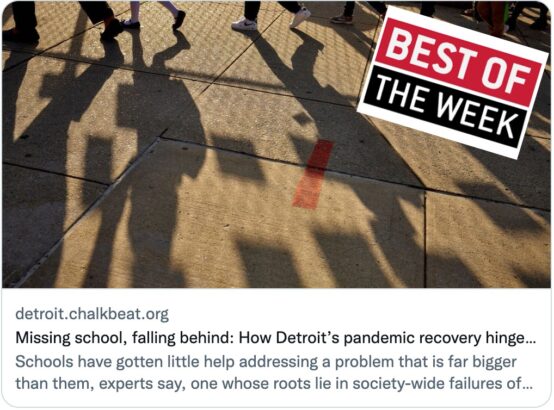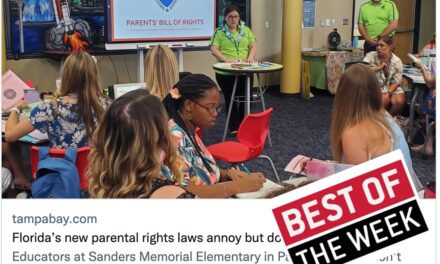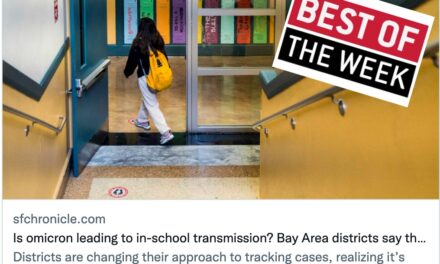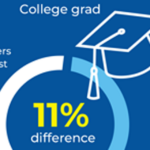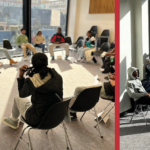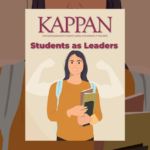In this week’s newsletter: A “red wave” in education failed to pan out in Tuesday’s midterms, despite all predictions. Why efforts to fix reading instruction could fall short again, just like they did 20 years ago. A reporter covering youth mental health decides to put her sources over her stories. EdWeek runs a controversial oped. And a week of good news for The 74 includes the hiring of veteran education journalist (and The Grade contributor) Greg Toppo.
RED WAVE CRASHES
The big story of the week, according to us
Despite countless media stories about Chris Rufo, book bans, and Moms for Liberty in the runup to the midterms, conservative candidates and causes didn’t fare particularly well in Tuesday’s election. Don’t let anyone tell you otherwise. The poor results “called into question the power of culture war education politics,” noted the Washington Post. Well-funded groups like Moms for Liberty saw only “mixed results” from their much-touted efforts, according to USA Today. Preliminary analysis from Ballotpedia finds that 361 school board winners were pretty evenly divided among those who opposed or supported COVID, race, and sex/gender issues or didn’t have a strong or clear position. Even Chalkbeat noted that school culture wars weren’t as compelling “as some candidates had hoped.” Here’s a sampling of the coverage:
🔊 School culture war campaigns fall flat in some tight races (Washington Post)
🔊 How Republicans fared in school board elections all over the country (USA Today)
🔊 California voters approve Proposition 28 for music and arts education funding (LA Times)
🔊 Miami-Dade voters overwhelmingly approve measure to boost teacher pay (Miami Herald)
🔊 Voters approve amendment to spend more on early childhood education (Albuquerque Journal)
🔊 Texas State Board of Education moves further right (Dallas Morning News)
🔊 Anti-CRT, pro-parental rights candidates win seats on Hamilton County school boards (WFYI)
🔊 One conservative, one left-leaning candidate leading for Loudoun school board (Washington Post)
Other big stories this week: A federal judge in Texas has struck down the Biden loan forgiveness plan. Schools closed again across Florida in anticipation of the rare late-season Hurricane Nicole. And a student was shot and killed at a North Seattle High School in what officials believe was a “targeted attack.”
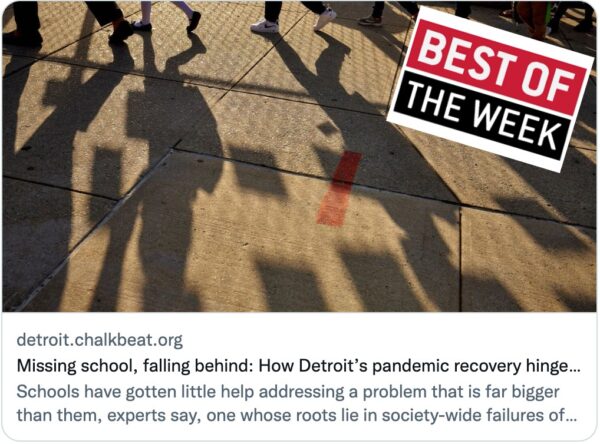
DIGGING INTO ABSENTEEISM
The best education journalism of the week, according to us
🏆 BEST: The best education journalism of the week is Not ‘present,’ and paying a steep cost by Koby Levin and Ethan Bakuli for Chalkbeat Detroit. We’ve heard a lot about chronic absenteeism still being a problem, but this story stands out for how it considers factors outside of the classroom contributing to the issue. Detroit has among the highest absentee rates in the country — two-thirds of students missed at least one of every 10 days last year. However, despite the district’s efforts to bring kids back, the story acknowledges that the problem is far bigger than any school can address, and this is vital to telling the absenteeism story. “We can’t see it just as a schools issue,” said one advocate. “Some of what chronic absence reflects is economic inequities in our societies, lack of access to healthcare, flexibility in work, lack of access to decent transportation.” These factors should be a part of every story.
See also: What Will It Take to Keep SF Students in School Amid the Spike in Absenteeism? (SF Standard)
🏆 RUNNER-UP: This week’s runner-up is At NYC school with sharpest drop in math scores, high poverty, crowded classrooms and a recent gun scare by Liam Quigley in Gothamist. For this story, Quigley zeroes in on Medgar Evers College Preparatory School in Crown Heights, Brooklyn, which saw the biggest drop in state math test scores in the city. It’s not the most deeply reported feature I’ve ever seen, but Quigley talked to parents and students about what they deal with on a daily basis and asked them why they thought scores dropped — instead of relying on experts and other people outside the classroom. “We are a predominantly Black school,” said one parent reflecting on remote learning. “Some, I should say, a lot, of parents lost their jobs. And some students didn’t have Internet.” Sometimes it seems like reporters forget that parents and students are also experts they can refer to in stories. They know what goes on in the classroom and at home. I love to see them quoted in stories like these, and would love to see even more of it.
BONUS:
🏆 Subject Matters: Diversity in Schools (Journal-Gazette)
🏆 Skilled trade programs are having a moment (Marketplace)
🏆 Pranks, Parties and Politics: Ron DeSantis’s Year as a Schoolteacher (NYT)
🏆 Grass Valley Teens Stand Up to Racist Bullying as School Board Election Becomes a Battleground (KQED)
🏆 With Maryland’s population of English learners spiking, resources lag behind those of other states (Baltimore Sun)
🏆 Nearly 3,700 migrants have been bused to Chicago from Texas. 425 have enrolled in local public schools. (Chalkbeat Chicago)
🏆 Texas High Schoolers Must Retake SATs After Tests Fly Off UPS Truck (New York Times)
BOTCHED READING COVERAGE; SOURCES OVER STORIES
New commentary from The Grade
In the midst of the current surge of high-quality media coverage of reading problems, it’s hard to remember how little mainstream news has done to help fix reading instruction — or how easily it could botch things up again.
Twenty-two years ago when the Blue-Ribbon National Reading Panel report came out, researchers and educators expected it would transform how schools taught reading. But the report struggled to gain adequate attention. How could this have happened? After talking with insiders like Claudio Sanchez, Andrew Brownstein, and Tim Shanahan, journalist Will Callan concludes among other things that the report was too easily “shunted into a ready-made ‘reading wars’ narrative.” Let’s not let happen again, right?
Also: Writing about youth mental health challenges, Milwaukee Journal Sentinel education reporter Rory Linnane realized that she wanted to change her approach, putting sources over stories rather than the other way around. In a new piece for The Grade, Linnane writes about “steps journalists can take to prioritize the well-being of sources — and resources to support our own mental health, too.” It’s a powerful, uplifting piece about reconsidering the traditional practices of journalism.
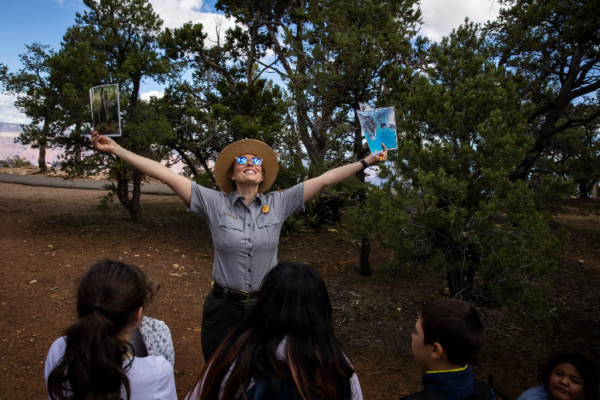
CLASSROOM IN A PARK
Coverage of promising innovations & signs of progress
Above: The nation’s only school district located inside a national park has figured out how to get wi-fi to classrooms, transport student athletes to faraway games, and incorporate the diversity of the students into its curriculum. (Boston Globe)
💡 The conflict over reading instruction in California is coming to an end with a shift to phonics-based instruction. (CalMatters)
💡 New Jersey is now mandating that schools teach about climate change in nearly every subject, including PE. (Hechinger Report)
💡 A Latino community in the Berkshires is helping Spanish-speaking families navigate the school system and support their children. (Berkshire Eagle)
💡 A new book looks at three ordinary school districts that overcame the “fragmentation, isolation, and lost learning opportunities of the public school system.” (Washington Post)
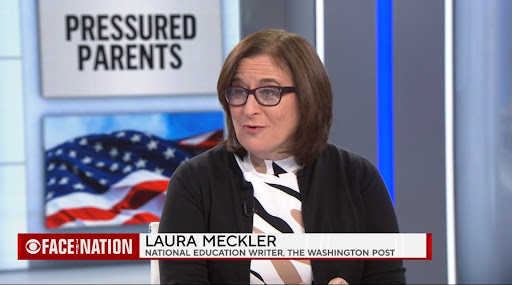
PEOPLE, JOBS
Who’s doing what, going where
Above: The Washington Post’s Laura Meckler was on CBS’ Face the Nation on Sunday talking about the impact of the pandemic on test scores.
🔥 Check yourself: There are two good articles out this week asking questions about common narratives. In one, The 74’s Linda Jacobson examined LAUSD’s 9-point jump in NAEP scores, finding that the inclusion of high-performing charters are one factor. And K-12 Dive’s Naaz Modan reports on the unspent ESSER funding narrative: “Are people really taking the time to go in and sit down with someone like myself or our school district and really dig in and ask the questions?” says one district official in the piece.
🔥 Career moves: Veteran education reporter (and The Grade contributor!) Greg Toppo is joining The 74 as a senior writer, starting next week. The Atlanta Journal-Constitution’s Vanessa McCray covered her last Atlanta school board meeting before moving onto the higher ed beat. After 38 years at the Providence Journal, for nearly half of which she covered K-12 education, blunt-speaking reporter Linda Borg is retiring. Congrats to all!
🔥 Resources: For the Hechinger Report, Jill Barshay explains why the online tutoring that many schools are spending on might not actually help kids catch up. A Pew Research Center report shows that parents differ sharply by party over what their children should learn in school. A much-disputed new study reported in the New England Journal of Medicine claims that schools lifting masks increased COVID infections. EdWeek’s Caitlynn Peetz points out that while well-used time in the classroom correlates with higher achievement, few schools are adopting longer years or days. And the Washington Post notes that mixed-race communities have quietly become the norm.
🔥 Job openings: GBH is hiring an education editor. The LA Times is hiring a reporter and an audience engagement editor for early childhood education. Check previous editions of the newsletter for other job openings that may still be open.
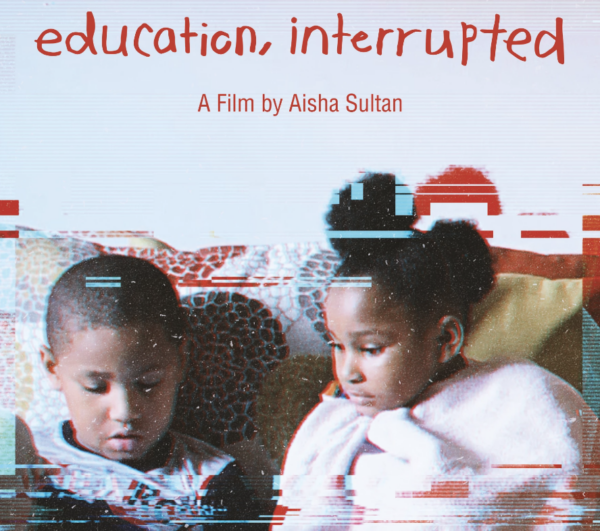
PODCASTS, DEADLINES
What’s happening and new research
Above: “We have a moral obligation not to just look away from the impact of these two years of disruption,” says St. Louis Post-Dispatch columnist Aisha Sultan, whose new documentary follows a mother for a year and a half during the pandemic.
⏰ Podcasts: APM Reports is out with The Company, Episode 5 of Sold a Story, which picks apart a publishing company whose products are used in schools all over the country. (See also the companion piece from Christopher Peak). AJC education editor Eric Stirgus, state education reporter Ty Tagami, and columnist Maureen Downey were on AJC Live to discuss election results with school implications. Also: The 74’s Kevin Mahnken was on the Class Disrupted podcast talking about whether there really is a teacher shortage, and Linda Jacobson was on EduRecoveryHub’s The Route K-12 Podcast to talk about education recovery in the media — a topic we love!
⏰ Deadlines: Applications are open for the Solutions Journalism Network’s nine-month Journalists of Color fellowship, and the deadline to apply is Nov. 22. Got an ambitious reporting project or idea for improving your newsroom? Apply for a Knight-Wallace Fellowship. International applications are due Dec. 1, and U.S. applications are due Feb. 1.
⏰ Questionable decisions: Last week, it was Chalkbeat’s “no comment” in response to questions about plagiarism in some of its Philadelphia coverage. This week, it’s Education Week’s decision to run a Lucy Calkins opinion piece that doesn’t grapple meaningfully with concerns about her approach to literacy instructions.
THE KICKER
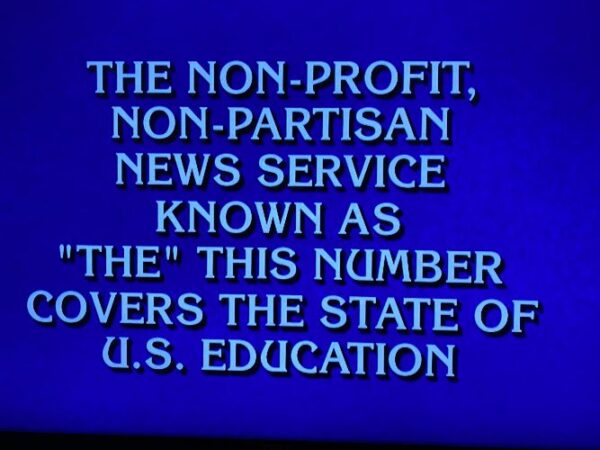
That squealing sound you heard earlier this week was everyone at The 74 reacting to this recent Jeopardy! clue. Congrats to all involved.
That’s all, folks. Thanks for reading!
By Alexander Russo with additional writing from Colleen Connolly.
ABOUT THE AUTHOR

The Grade
Launched in 2015, The Grade is a journalist-run effort to encourage high-quality coverage of K-12 education issues.


